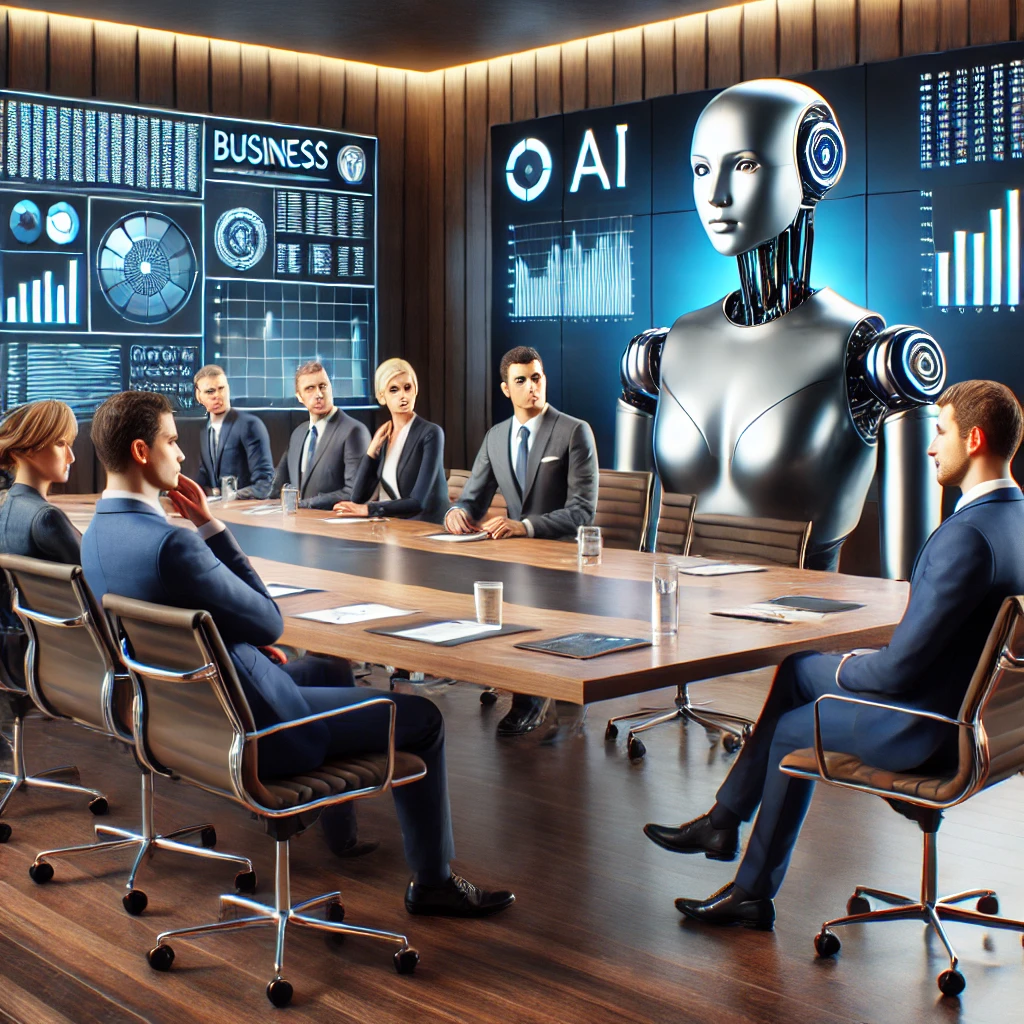Would You Trust an AI CEO to Run a Company? Why or Why Not?
Pioneering organizations across the globe are contemplating a radical transformation in corporate leadership as artificial intelligence advances beyond operational tasks into strategic decision-making roles. The prospect of an AI CEO managing complex business operations, directing company strategy, and leading teams raises profound questions about the future of corporate governance and organizational management. This exploration delves deep into the possibilities, challenges, and implications of entrusting artificial intelligence with the highest level of corporate responsibility.
We strongly recommend that you check out our guide on how to take advantage of AI in today’s passive income economy.
Table of Contents
The Evolution of AI in Corporate Leadership
The integration of artificial intelligence into corporate leadership represents a fundamental shift in how we conceive organizational management. Traditional leadership models, built on centuries of human experience and intuition, are being challenged by systems capable of processing vast amounts of data and generating insights at unprecedented speeds. In boardrooms worldwide, executives grapple with the implications of AI systems that can analyze market trends, predict economic shifts, and propose strategic initiatives with remarkable accuracy.
Today’s AI systems demonstrate capabilities that extend far beyond simple automation or data analysis. These sophisticated platforms can now engage in complex decision-making processes, considering multiple variables and potential outcomes simultaneously. They evaluate market conditions, assess competitive landscapes, and generate strategic recommendations that often match or exceed human analysis in both depth and accuracy. This evolution marks a significant departure from AI’s traditional role as a tool for specific tasks, pushing boundaries into territories once considered exclusively human domains.
Current AI Applications in Business Management
The practical implementation of AI in corporate settings has already yielded remarkable results across various sectors. Financial institutions employ AI systems that manage investment portfolios worth billions, making split-second decisions based on market conditions and historical data analysis. Manufacturing companies utilize AI to optimize entire supply chains, from raw material procurement to final product delivery, achieving efficiency levels previously thought impossible. These successes provide compelling evidence for AI’s potential in higher-level management roles.
Enterprise-level AI systems now demonstrate sophisticated capabilities in areas traditionally requiring human judgment. They analyze customer sentiment across millions of interactions, predict market trends with increasing accuracy, and generate comprehensive business strategies based on complex data sets. Major corporations have begun experimenting with AI systems that participate in executive-level decision-making, providing insights and recommendations that influence critical business directions.
The Human-AI Leadership Dynamic
The relationship between human leaders and AI systems continues to evolve, creating new paradigms for organizational management. Rather than a simple replacement of human leadership, emerging models suggest a symbiotic relationship where AI enhances and amplifies human capabilities. This partnership leverages AI’s computational power and data processing abilities while maintaining the crucial human elements of leadership – empathy, ethical judgment, and creative problem-solving.
Successful implementation of AI in leadership roles requires careful consideration of how these systems interact with human team members. Organizations must develop frameworks that clearly define roles, responsibilities, and decision-making authorities between AI systems and human leaders. This includes establishing protocols for handling disagreements between AI recommendations and human judgment, ensuring transparency in decision-making processes, and maintaining clear lines of accountability.
Challenges and Considerations
The implementation of AI CEO systems presents significant technical, ethical, and organizational challenges that must be carefully addressed. Organizations must navigate complex questions about accountability, control, and the appropriate balance between algorithmic efficiency and human judgment. These challenges extend beyond technical considerations into fundamental questions about the nature of leadership and decision-making in modern organizations.
Technical Limitations and Data Requirements
Current AI systems face substantial technical hurdles in replicating human leadership qualities. The massive data requirements for training effective AI leadership models present significant challenges, particularly regarding strategic decision-making where historical data may not predict future success accurately. Organizations must invest heavily in data infrastructure, ensuring the quality and relevance of information used to train AI systems while addressing privacy and security concerns.
The complexity of leadership decisions often extends beyond purely data-driven analysis. Human leaders regularly make decisions based on incomplete information, utilizing intuition and experience to navigate uncertainty. Replicating these capabilities in AI systems requires advances in areas such as contextual understanding, emotional intelligence, and adaptive learning – areas where current AI technology still shows limitations.
Ethical Implications and Trust
The concept of an AI CEO introduces complex ethical considerations regarding responsibility and accountability. Stakeholders must trust that AI systems will make decisions aligned with both business objectives and societal values, requiring careful governance frameworks and transparent operation protocols. Organizations must address questions about bias in AI decision-making, ensuring that automated systems do not perpetuate or amplify existing inequities in corporate leadership.
Future of AI Corporate Leadership
The trajectory of AI in corporate leadership points toward increasingly sophisticated integration of machine intelligence with human expertise. As AI systems become more advanced in their ability to process complex information and generate nuanced recommendations, organizations must prepare for a future where leadership decisions involve both human and artificial intelligence working in concert. This evolution requires careful consideration of how to maintain the best aspects of human leadership while leveraging the powerful capabilities of AI.
The relationship between AI and human leadership continues to evolve through various stages of sophistication. Early implementations focused primarily on decision support and data analysis, but newer systems demonstrate capabilities in strategic planning and organizational development. These advancements suggest a future where AI CEOs might handle specific aspects of corporate leadership while working alongside human executives who provide oversight and strategic direction.
Building Effective Co-Leadership Models
Creating successful co-leadership models between AI systems and human executives requires careful attention to organizational structure and decision-making processes. Companies must develop clear frameworks that delineate responsibilities between AI and human leaders, establishing protocols for handling complex decisions that require both analytical precision and human judgment. These models must be flexible enough to adapt as AI capabilities continue to evolve while maintaining clear lines of accountability.
Organizations pioneering AI leadership integration have discovered the importance of creating balanced systems that leverage both artificial and human intelligence effectively. This includes developing mechanisms for resolving conflicts between AI recommendations and human intuition, establishing clear communication channels between AI systems and human team members, and ensuring that decision-making processes remain transparent and accountable to all stakeholders.
Preparing for AI Integration
The successful implementation of AI leadership requires comprehensive preparation across all organizational levels. Companies must invest in both technological infrastructure and human capital development to create environments where AI and human leaders can work effectively together. This preparation includes training programs for employees at all levels to work effectively with AI systems, developing new protocols for decision-making and accountability, and creating mechanisms for continuous evaluation and improvement of AI-human collaboration.
Cultural transformation plays a crucial role in preparing organizations for AI leadership integration. Companies must foster an environment where employees feel comfortable working alongside AI systems, understanding both the capabilities and limitations of artificial intelligence in leadership roles. This includes addressing fears about job displacement while highlighting opportunities for enhanced performance through human-AI collaboration.
Organizational Impact and Adaptation
The introduction of AI CEOs fundamentally changes organizational dynamics and requires careful consideration of how these changes affect company culture, employee motivation, and team performance. Organizations must develop new approaches to managing these relationships, ensuring that both human employees and AI systems can work together effectively toward common goals.
Traditional organizational hierarchies may need to be reimagined to accommodate AI leadership effectively. This might include creating new roles focused on AI-human collaboration, developing specialized teams for AI system oversight, and establishing new protocols for decision-making that incorporate both artificial and human intelligence. Companies must also consider how to maintain employee engagement and motivation in an environment where significant decisions may be influenced by AI systems.
Performance Measurement and Accountability
Developing effective metrics for evaluating AI CEO performance presents unique challenges that organizations must address. Traditional performance measures may need to be adapted or completely reimagined to accurately assess the effectiveness of AI leadership while ensuring accountability to stakeholders. This includes creating new frameworks for measuring both quantitative outcomes and qualitative aspects of organizational performance under AI leadership.
Organizations must also establish clear mechanisms for oversight and control of AI leadership systems. This includes developing protocols for regular performance reviews, creating systems for monitoring AI decision-making processes, and establishing clear lines of accountability when problems arise. These mechanisms must balance the need for effective oversight with the flexibility required for AI systems to operate efficiently.
Conclusion: The Path Forward
The question of trusting an AI CEO to run a company represents more than a simple technological challenge – it embodies a fundamental shift in how we think about leadership, decision-making, and organizational management. While artificial intelligence continues to demonstrate remarkable capabilities in specific areas of business management, the most promising path forward appears to lie in developing sophisticated co-leadership models that combine AI’s analytical power with human judgment and creativity.
The future of corporate leadership will likely be characterized by intelligent collaboration between human executives and AI systems, each contributing their unique strengths to organizational success. Organizations that can effectively navigate this transition, building robust frameworks for human-AI collaboration while maintaining clear accountability and ethical standards, will be best positioned to thrive in an increasingly automated business landscape.
As we move forward, the focus should remain on how AI can augment and enhance human leadership rather than replace it entirely. The successful integration of AI CEOs will require careful attention to technical capabilities, ethical considerations, and organizational dynamics, ensuring that artificial intelligence serves as a powerful tool for improving corporate performance while maintaining the essential human elements that drive long-term success.
By embracing these challenges and opportunities thoughtfully, organizations can work toward a future where AI and human leadership complement each other effectively, creating more resilient, innovative, and successful enterprises. The journey toward AI leadership integration has only begun, and the organizations that approach this transformation with wisdom, creativity, and careful consideration will help shape the future of corporate leadership for generations to come.

We strongly recommend that you check out our guide on how to take advantage of AI in today’s passive income economy.




